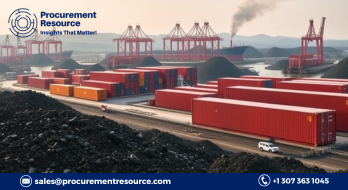Australia's Thermal Coking Coal Prices Continue to Slide Due to Softening Natural Gas Prices and Stagnant Sea-Borne Trade
.webp)
Due to easing production disruptions, dropping international gas costs, and softening seaborne demand, Australian-grade thermal coal prices have decreased since the beginning of 2023 from record highs in 2022. The price of Australian 5,500 kcal/kg thermal coal decreased from its peak of USD 350 in March 2022 to USD 118 per tonne as of February 28, 2023.
However, FOB unit costs (excluding royalties) have increased dramatically as a result of lower production yields and greater prices for consumables, logistics, energy inputs, and labour, in addition to lower production yields.
Request Access For Regular Price Update of Coal
Wet weather in 2022 and a labour shortage were the main causes of production delays. Although the weather has lately improved, some open-cut mines' production has not yet fully recovered because of too much water on the property, as is the situation with Yancoal Australia's open-cut mines in New South Wales (NSW).
The margins of the main Australian thermal coal miners may be reduced by rising costs and falling thermal coal prices, but the major miners should continue to produce substantial operating cash flows to fund debt repayments, expansion plans, and shareholder dividends.
Consumables and energy input costs may go down in response to a slowdown in global inflation, but Fitch anticipates that the cost of hiring Australian miners will continue to rise, at least in the short term, as shown by Yancoal Australia's operational projections for 2023.
This is because Australia is still having difficulty attracting skilled workers to the country. According to recent data from miners, more than 50% of the unit expenses were made up of labour and logistics expenditures, including the usage of contractors.
Yet, if thermal coal prices decline even more sharply, as they did in prior downturns, miners may have some discretion to cut roster sizes and minimise maintenance costs.
The price of Australian-grade thermal coal is predicted to reduce, but the decline in 2023 will be constrained by factors such as high demand from India, China relaxing import restrictions, and supply limitations brought on by Russian sanctions. Major miners should be able to continue producing strong operating cash flows as a result.
With average realised prices more than doubling from 2021 to 2022, major Australian thermal coal miners produced sizable operating cash flows. The primary uses of free cash flow were to pay down debt and increase shareholder returns.
As banks restrict lending to the fossil fuel industries, Whitehaven Coal, Yancoal Australia, and BHP Group Limited (A/Stable) are speeding debt repayments at their NSW port joint venture, Newcastle Coal Infrastructure Group Pty Ltd, through increasing tonnage charges to lower refinancing risks.
Several miners have set aside extra capital to finance their expansion projects due to the higher financing risks associated with new coal operations. Whitehaven Coal estimates that when it develops the Vickery and Winchester South projects, it will keep around AUD 880 million in cash.
Read More About Coal Production Cost Reports - REQUEST FREE SAMPLE COPY IN PDF
Major Australian thermal coal miners shouldn't be significantly impacted by the NSW Coal Reservation Plan in terms of cash flow, according to Fitch. In order to help the federal government in extenuating the high domestic energy prices, the scheme, which runs from April 1, 2023 to June 30, 2024, mandates that miners set aside a portion of their output to supply the domestic market at a capped, delivered price of AUD125/t.
Compared to the miners' annual attributable saleable production, the volume subject to the price cap is negligible, at roughly 4% and 5% for Yancoal Australia and Whitehaven Coal, respectively.
Although the precise framework for the compensation has not yet been finalised, additional expenditures to develop new transport routes to power plants and for procuring lower-grade coal to meet the commitments could potentially be recoverable.
As per Procurement Resource, Australian-grade thermal coal prices have come down from record highs in 2022 because of easing production difficulties, declining global gas prices, and decreasing seaborne demand.
The major reasons for production delays in 2022 were wet weather and a labour shortage. The production at some open-cut mines has not yet fully recovered despite recent improvements in the weather because there is still too much water on the land, as is the case with Yancoal Australia's open-cut mines in New South Wales (NSW).




.webp)